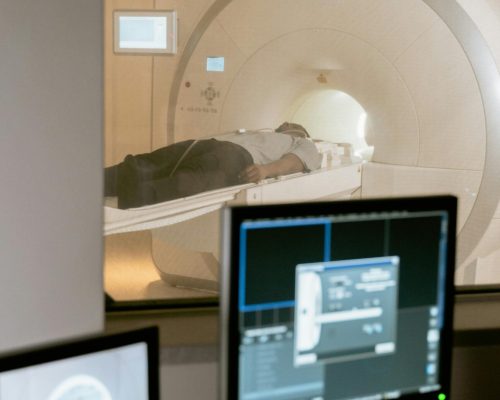Introduction
When it comes to diagnosing brain-related conditions, doctors often recommend imaging tests to see inside the brain. Two of the most common options are brain MRI vs brain CT. Both tests provide detailed images of the brain, but they work in different ways and are useful for different conditions. Understanding the differences can help patients make informed decisions when recommended one of these scans. At ER OF COPPELL, we provide advanced imaging services to ensure patients receive accurate diagnoses quickly.
What is a Brain MRI?
A Brain MRI (Magnetic Resonance Imaging) is a test that uses powerful magnets, radio waves, and a computer to create detailed images of the brain. Unlike CT scans, MRIs do not use radiation.
Key Features of Brain MRI:
-
Uses magnetic fields and radio waves
-
Produces high-resolution images
-
Takes 30–60 minutes to complete
-
Better at showing soft tissues like the brain, nerves, and tumors
Best For:
-
Detecting brain tumors
-
Multiple sclerosis (MS)
-
Stroke damage
-
Infections
-
Brain structure abnormalities
What is a Brain CT?
A Brain CT (Computed Tomography) scan uses X-rays and computer technology to produce cross-sectional images of the brain. CT scans are faster than MRIs and are often used in emergency situations.
Key Features of Brain CT:
-
Uses X-rays and radiation
-
Scan takes 5–10 minutes
-
Good for detecting bleeding, fractures, and trauma
-
Available in most emergency rooms
Best For:
-
Detecting bleeding in the brain
-
Skull fractures
-
Stroke emergencies
-
Severe head injuries
Brain MRI vs Brain CT: Main Differences
| Imaging Technique | Magnetic fields & radio waves | X-rays & radiation |
| Scan Time | 30–60 minutes | 5–10 minutes |
| Radiation | No | Yes |
| Best For | Tumors, soft tissues, infections | Bleeding, fractures, trauma |
| Cost | Higher | Lower |
| Availability | Specialized centers | Widely available |
When Doctors Recommend Brain MRI
Doctors recommend MRIs when they need more detailed images of the brain. For example:
-
Suspected brain tumor
-
Unexplained seizures
-
Checking for nerve damage
-
Investigating chronic headaches
-
Diagnosing multiple sclerosis
When Doctors Recommend Brain CT
Doctors recommend CT scans when speed and emergency care are most important. Common uses include:
-
Head trauma or injury
-
Detecting stroke bleeding
-
Checking for skull fractures
-
Evaluating sudden severe headaches
-
Emergency cases where MRI takes too long
Pros and Cons of Brain MRI
Pros:
-
No radiation exposure
-
Excellent for soft tissue details
-
Can show small abnormalities
Cons:
-
Expensive
-
Takes longer
-
Not suitable for patients with metal implants or pacemakers
Pros and Cons of Brain CT
Pros:
-
Fast and widely available
-
Great for emergencies
-
More affordable than MRI
Cons:
-
Uses radiation
-
Less detail for soft tissues
-
Not ideal for chronic conditions
Which Test is Safer?
-
MRI: Safer for long-term since it avoids radiation, but not suitable for patients with metal implants.
-
CT: Uses radiation, so repeated scans should be avoided unless necessary.
Cost Comparison
-
Brain MRI: More expensive (hundreds to thousands of dollars depending on facility).
-
Brain CT: More affordable and usually covered in emergencies.
At ER OF COPPELL, our team helps patients choose the most effective and cost-efficient option depending on their condition.
Brain MRI vs Brain CT: Easy Summary
-
MRI = Best for soft tissues and detailed brain conditions.
-
CT = Best for emergencies like trauma, fractures, and bleeding.
Both scans are valuable tools, and your doctor at ER OF COPPELL will guide you to the right choice based on your symptoms.
FAQs
1. Is MRI better than CT for the brain?
MRI gives more detailed images, especially of soft tissues, while CT is better for emergencies and bone injuries.
2. Which is faster: MRI or CT?
CT is much faster (5–10 minutes) compared to MRI (30–60 minutes).
3. Does a brain CT use radiation?
Yes, CT scans use X-rays, which expose patients to small amounts of radiation.
4. Can I get both MRI and CT scans?
Yes, sometimes doctors order both to get a complete picture of the brain.
5. Does ER OF COPPELL offer brain scans?
Yes, ER OF COPPELL provides advanced imaging including CT scans and can refer patients for MRI if needed.
 :
https://backlinksseo.in/7-powerful-insights-to-reduce-emergency-room-wait-times-er-of-coppell/
:
https://backlinksseo.in/7-powerful-insights-to-reduce-emergency-room-wait-times-er-of-coppell/

